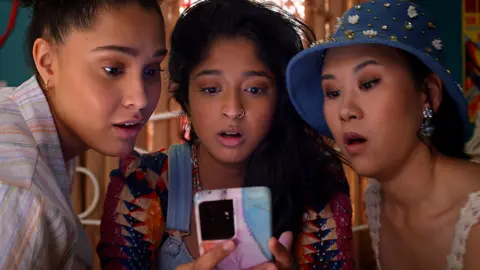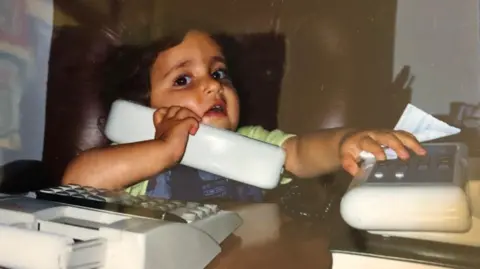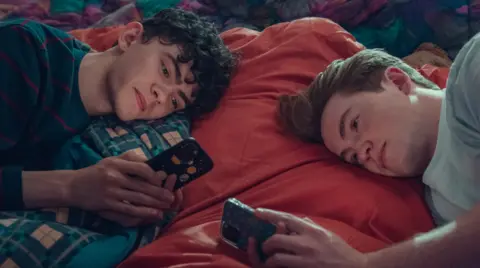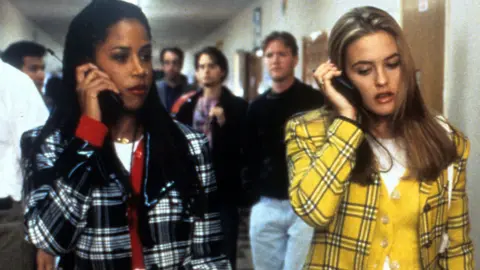 Netflix
NetflixHello, you have reached Yasmin Rufo's voicemail. Please do not leave a message as I will not listen to it or call you back.
Unfortunately this is not my answer phone message, but do I want to be like that, along with most Gen Z and Millennials? Absolutely.
A recent survey found that a quarter of 18- to 34-year-olds never talk on the phone – Respondents say they ignore ringing, respond by text or look online if they don't recognize the number.
A Uswitch survey of 2,000 people also found that 70% of 18-34 year olds prefer a text to a phone call.
For older generations, talking on the phone is normal—my parents spent their teenage years fighting over landlines on the porch with their siblings.
 Yasmin Rufo
Yasmin RufoInstead, my teenage years were spent texting.
From the moment I got my pink Flip Nokia on my 13th birthday, I've been obsessed with texting.
I would spend every evening after school creating 60-character texts for my friends, deleting every unnecessary space and vowel until I resembled consonants that even GCHQ struggled to understand.
After all, when it costs 10p a text, there's no way I'm spilling more than 61 characters.
In 2009, phone calls on my cell phone cost a lot.
“We didn't give you this phone so you could gossip with your friends all evening,” my parents would remind me when they looked at my monthly phone bill.
And so the texter generation was born: mobile phone calls were for emergencies and landlines were rarely used to talk to your grandparents.
 Good pictures
Good picturesDr. Elena Touroni, a counseling psychologist, explains that because young people have not developed the habit of talking on the phone, “now it feels strange because it's not normal.”
This can make young people panic when their phones start ringing (or the under-35s will blink quietly because they don't have a loud ringtone).
More than half of young people who responded to a Uswitch survey admitted they thought an unexpected call was bad news.
Psychiatrist Eloise Skinner explains that the anxiety surrounding the calls comes from “an association of something bad – a sense of foreboding or dread”.
“With our busy lives and unpredictable work schedules, we rarely have time to call a friend. Phone calls are reserved for important messages in our lives, which are often complicated and difficult.”
“It's just right,” says Jack Langley, 26, who says he never answers numbers he doesn't know because “they're scammers or cold callers.”
“It's easy to ignore calls to find out which ones are legitimate.”
 Netflix
NetflixBut not talking on the phone doesn't mean teenagers aren't in touch with their friends — our group chats ping throughout the day with a mix of casual messages, memes, gossip and, more recently, voice memos.
Most of these conversations now take place on social media, especially on Instagram and Snapchat where it's easy to send pictures and memes along with text.
While we all agree that phone calls are a big no-no, the use of voice memos has divided the younger generation.
In a Uswitch survey, 37% of 18-34s say voice memos are their communication preference. By comparison, only 1% of 35- to 54-year-olds prefer voice messages to calls.
 Good pictures
Good pictures“Voice note is like talking on the phone but better,” said 19-year-old student Susie Jones. “You get the benefits of hearing your friend's voice, but without the pressure, so it's a very polite way of communicating”.
But for me, listening to a five-minute voice note updating a friend on their life is painful — they're sideways, every second word is “like” or “umm,” and the whole story could have been told in one sitting. A couple of text messages.
Both texts and voice notes allow young people to participate in conversations at their own pace and allow them to provide more thoughtful and considered responses.
Workplace phone phobia
But to what extent does the fear of phone calls in your personal life begin to affect your work life?
Henry Nelson-Case is a 31-year-old lawyer and content creator whose “extremely millennial” videos are painfully relatable—sketches include the anxiety of sending company-wide emails and politely refusing to work overtime. An employee does anything to avoid a phone call.
“The anxiety associated with real-time conversations, the potential awkwardness, the lack of answers and the pressure to respond immediately,” he says, make him hate talking on the phone.
“Phone calls are more revealing and require more intimacy, whereas messaging is detached and allows you to connect without feeling vulnerable or exposed,” explains Dr. Touroni.
 Good pictures
Good picturesDonja Relic, a 27-year-old lawyer, says to stay away from workplace calls, “they take up time and put you back in your tasks”.
Skinner describes it as 'it could have been an email'.
“Our time is increasingly security-conscious, and calling someone requires the recipient to pause their day and focus on the conversation — a difficult thing for multitaskers.”
James Holden, a 64-year-old business owner, says his younger employees rarely answer phone calls, saying “they either have a default message saying they're busy or they put my number on diverted calls so the call doesn't go through.”
“They always have an excuse up their sleeves, the most common being that my phone is on silent so I didn't see it and forgot to call you later.”
He says he must adapt after noticing a “visible communication gap” and “if employees are more comfortable with texts, it's my responsibility to respect that choice.”
permission Twitter Content?
But with the preference for non-verbal communication and the trend towards working from home, are we losing the capacity for unplanned and informal conversations?
If the current trend continues “we will lose intimacy or connection,” says Skinner.
“When we communicate verbally, we feel more connected emotionally, professionally or personally,” she continues. “This connection, especially in the workplace, can lead to a greater sense of fulfillment.”
Ciara Brady, a 25-year-old supermarket area manager, encourages the trend, saying she “loves and appreciates it when my seniors at work call me.”
“It's more thoughtful than a text because it requires a certain amount of effort, so you know your manager values your input.”
She likes talking to colleagues on the phone on days when she works from home because “it can be lonely, so it's nice to stay connected”.
While some may claim that this new communication trend is further proof that we're a “generation snowflake,” it's actually far from it.
Rather, it is about adaptation. No doubt people resisted the switch from fax to e-mail 25 years ago, but this shift has made communication more efficient.
Just as we abandoned the fax machine in the 1990s, we may abandon dreaded phone calls in 2024.
